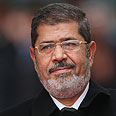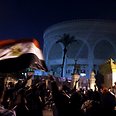

Egypt's opposition attacked President Mohamed Morsi on Friday for calling elections during a national crisis, but face a test of unity in challenging Islamists who have won every poll since the 2011 revolution.
No sooner had Morsi called the parliamentary polls on Thursday than liberals and leftists accused him of deepening divisions between Islamists and their opponents. Some threatened to boycott voting which starts on April 27th and finishes in late June.
Related stories:
- Egypt protest group signs Morsi for space op
- Egypt's Brotherhood still operates secretively
- Aide: Egypt flooded tunnels to cut Gaza arms flow
Voting is held in stages due to a shortage of election monitors and Morsi's choice of dates upset the Christian minority, which makes up about 10% of the population.
Egypt's state TV Channel One and Nile TV said later in separate scrolling news headlines that the presidency would change the date of the parliamentary vote because it falls on Coptic Easter holidays, in an effort to appease the Coptic minority. But no official statement was issued by the presidency to that effect.
Islamists, including the Muslim Brotherhood, which backs Morsi, dominated the old lower house, which was dissolved last year by court order. The new parliament will face tough decisions as Egypt is seeking an IMF loan deal which would ease its financial crisis but demand unpopular austerity.
Morsi called the elections, to be held in four stages around the country, hoping they can conclude Egypt's turbulent transition to democracy which began with the overthrow of autocrat Hosni Mubarak by popular protests.
Islamists hailed elections as the only way out of Egypt's political and economic crisis. However, liberal politician Mohamed ElBaradei said holding polls without reaching a national consensus would further "inflame the situation."
"The insistence on polarization, exclusion and oppression along with ... the deteriorating economic and security situation will lead us to the abyss," ElBaradei, a former United Nations agency chief, said on his Twitter feed.
Egypt is split between the Islamists, who want national life to observe religion more closely, and opposition groups which hold a wide variety of visions for the future.
Boycott decision
The National Salvation Front (NSF), which groups a number of parties opposed to the Islamists, said it would hammer out its stand on the elections.
"We will meet early next week to decide on whether we will boycott or go ahead with elections. But as you can see, the opposition overall is upset over this unilateral decision on part of the presidency. This was a rushed decision," said NSF spokesman Khaled Dawood.
Dawood said Egypt should have other priorities such as changing the controversial new constitution produced last year by an assembly dominated by Islamists. "Solve these issues first then talk about elections," he added.
Islamist parties and groups welcomed the new elections and dismissed the boycott threat
"Elections are the only way out of the crisis. The people must be able to choose those they see fit. The majority of political forces will not boycott the elections," said Tarek al-Zumor of the Building and Development Party.
The Islamists are likely to form coalitions and dominate the new parliament as they did in the previous short-lived lower house, which was dissolved after the Constitutional Court struck down the law used to elect it.
- Receive Ynetnews updates
directly to your desktop















